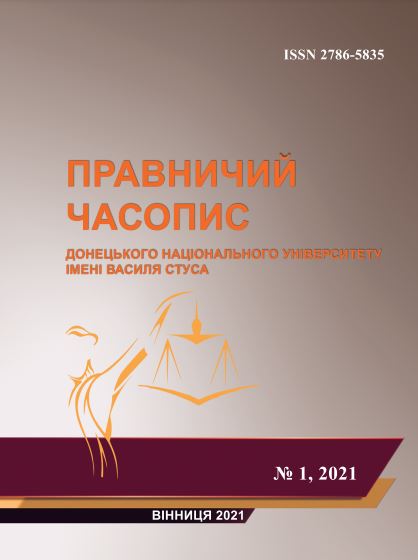Content of Law as a Complex General Theoretical Category
DOI:
https://doi.org/10.31558/2786-5835.2021.1.6Keywords:
content of law; will; volitional principle; rational principle; interest in law; existing law; proper lawAbstract
The article examines the specific features of the content of law as a complex general theoretical category.
It is concluded that the contents of the law include: interest, volitional principle, intellectual principle, as well as existing and proper principles.
It is revealed that although interest at the stage of law formation acts іs a reflection of the actual needs of individuals, it is much broader than the need, including due to the fact that, firstly, one need can determine a certain number of interests, and, secondly, interest can be generated by the current right, as a consequence of its action.
It is argued that the rule of law is the quintessence of consistency, laws of formal logic and legal technology. That is, to create law, the entire arsenal of rational thinking tools developed by mankind is used. But the intellectual (rational) principle in the content of law cannot be perceived solely in the form of compliance with the rules of formal logic, although this should be an integral quality of legal prescriptions. In a broad sense, the intellectual principle is manifested, on the one hand, in the correct assessment of interests when translating them into the content of law and choosing the right methods of influencing them, and, on the other, as a tool for rational assessment of the content of the norm by its addressee for subsequent implementation in actual behavior.
At the same time, the study of the intellectual moment in the content of law should take place exclusively in conjunction with the volitional one, since the separation of these categories makes any of them meaningless. The volitional moment mediates not only the legal behavior of the addressee of legal prescriptions, but also, for example, the will of the legislator, which encourages him to achieve the goal of streamlining public relations with the help of correctly interpreted and correctly reflected interests at the level of normative legal acts. That is, one understanding of needs and the means necessary to meet them is not enough if there is not enough will to implement them.
Regarding the existing and proper law in the content, it is concluded that the formalized norm should reflect in its content both the actual state of affairs (law in static) and lay down a certain number of predicted regulatory models for the future (law in dynamics). Otherwise, the regulations will be doomed to rapid obsolescence. That is, we can say that the existing and proper law mediate two spheres of its existence: 1) reflect actual relations in society and at the same time expand their boundaries, predicting social development; 2) are a reflection of today’s needs for ordering, but, at the same time, they are aimed at achieving an idealized order and the idea of law as a certain universe.
References
Проблемы теории государства и права: учебник / под ред. М. Н. Марченко. Москва: Норма, 2008. 784 с.
Общая теория права и государства: учебник / под ред. В. В. Лазарева. Москва: Юристъ, 2003. 520 с.
Алексеев С. С. Общая теория права: в 2-х т. Москва: Юридическая литература, 1981. Т. 1. 360 с.
Малько А. В., Субочев В. В. Законные интересы как правовая категория. Санкт-Петербург: Юридический центр Пресс, 2004. 359 с.
Чепис О. І. Охоронюваний законом інтерес у цивільному праві: поняття та структура. Порівняльно-аналітичне право. 2013. № 1. С. 129–134.
Венедіктова І. В. Окремі аспекти захисту законних інтересів у праві інтелектуальної власності. Право та інноваційне суспільство. 2013. № 1. С. 38–56.
Тихомиров Ю. А. Коллизионное право: учеб. и науч.-практ. пособ. Москва: ЮРИНФОРЦЕНТР, 2000. 394 с.
Здравомыслов А. Г. Проблема интереса в социологической теории. Ленинград, 1964.
Першина И. В. Интерес в праве: дис. … канд. юрид. наук: 12.00.01. Н. Новгород, 2002. 183 c.
Венедіктова І. В. Роль інтересу в поділі права на приватне і публічне. Університетські наукові записки. 2011. № 3(39). С. 61–68.
Кистяковский Б. А. Рациональное и иррациональное в праве. Хрестоматія з філософії права. Чернівці: Чернівецький національний університет ім. Юрія Федьковича, 2012. Т. 3: Гносеологія права.
Маисурадзе Н. Рациональное, экзистенциальное и интуитивное в свободно-варьированном интегральном и филоменном праве. URL: http://gisap.eu/ru/node/1167
Шенгерій Л. М. Раціональна та ірраціональна складові сучасної системи права. Вісник Київського національного університету імені Тараса Шевченка. 2006. № 81. С. 109–112.
Лихолат І. П. Раціональне та позараціональне в праві (на матеріалах законотворчості): автореф. дис. … канд. юрид. наук: 12.00.12. Київ, 2001. 19 с.
Крымский С. Б., Бургин М. С. Принципы рациональности и проблема их моделирования. Методологические аспекты естественнонаучных исследований. Київ: Наук. думка, 1985. С. 3–17.
Трофименко В. А. Розум та воля як антропологічні основи права: автореф. дис. … канд. юрид. наук: 12.00.01. Харків, 2004. 21 с.
Крыжановская О. А. Свобода, воля, власть (философские проблемы социальной и политической воли). Ростов-на-Дону: СКНЦ ВШ, 1996. 166 c.
Керимов Д. А. Методология права. Предмет, функции, проблемы философии права. Москва: Аванта+, 2001. 560 с.
Сенина Ю. Л. Категория воли в гражданском праве России (в аспекте гражданско-правовой сделки): автореф. дис. … канд. юрид. наук: 12.00.03. Томск, 2006. 27 с.
Коваленко О. О. Воля як філософсько-правова категорія. Збірник наукових праць Харківського національного педагогічного університету імені Г. С. Сковороди «ПРАВО». 2013. Вип. 20. С. 19–23.
Кабальський Р. О. Нормативність права як предмет філософського аналізу: автореф. дис. … канд. юрид наук: 12.00.12. Харків, 2008. 19 с.
Чефранов В. А. Правовое сознание как разновидность социального отражения. Киев, 1976. 138 с.
Міхайліна Т. В. Роль інтегративного потенціалу правосвідомості у реформуванні правової системи: монографія. Вінниця: ДонНУ імені Василя Стуса, 2018. 312 с.

